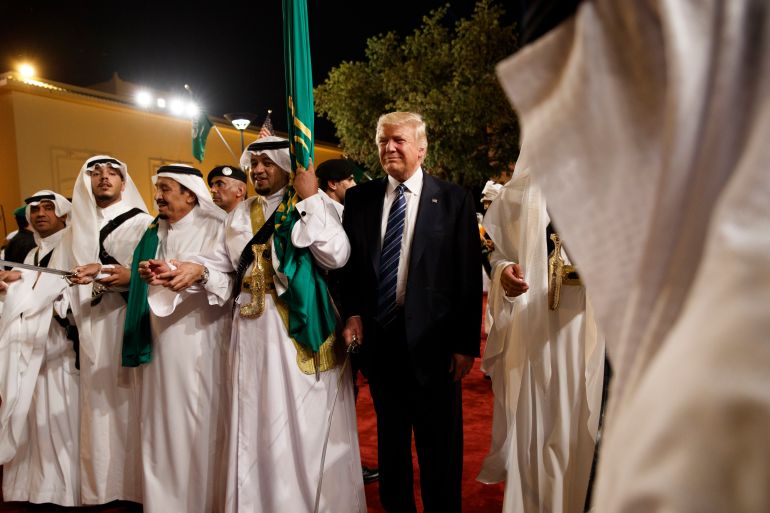Trump visits Saudi Arabia, Qatar, UAE: What to know
Trump’s first state visit of his second term will be to the Middle East, where economic opportunities and regional security top the agenda.

Published On 12 May 202512 May 2025
United States President Donald Trump will undertake a three-day tour of the Gulf for his first state visit since retaking office in January.
The trip begins in Saudi Arabia, followed by Qatar and the United Arab Emirates.
Recommended Stories
list of 3 itemsend of list
It marks Trump’s second foreign visit as president after he attended Pope Francis’s funeral in Rome in April.
Here is what to know about the trip and what is on the agenda:
When and where is Trump visiting?
Trump will fly out of the US on Monday and start his trip in the Saudi capital, Riyadh, on Tuesday.
He is expected to attend a Gulf summit in the city on Wednesday, visit Qatar later that day and conclude his visit in the UAE on Thursday.
Saudi Arabia was the first country Trump visited during his first term as well, breaking the tradition of US presidents starting with the United Kingdom, Canada or Mexico.

What is on Trump’s agenda?
His objectives are securing major economic deals and making diplomatic progress on issues that impact the region, including a Gaza ceasefire and stalled Saudi-Israel normalisation talks.
Advertisement
The focus on economic deals comes as the US recorded a drop in its economic output in the first quarter, its first in three years.
On Wednesday, Trump said he will also decide during his trip how the US refers to the “Persian Gulf”.
US media reported that he may decide to refer to the body of water as the Arabian Gulf or the Gulf of Arabia.
Saudi Arabia: Normalisation, business deals and weapons
Trump’s Middle East envoy Steve Witkoff said the president wants to expand the Abraham Accords, under which the UAE and Bahrain recognised Israel during Trump’s first term, to include Saudi Arabia.
Talks were reportedly under way on Saudi Arabia joining the accords, but after Israel began its war on Gaza in October 2023, Saudi Crown Prince Mohammed bin Salman (MBS) paused those discussions.
Saudi officials have said they won’t move forward unless there is real progress towards a two-state solution for Palestine, leading to speculation that Trump may propose a US-backed framework to end the war and revive normalisation efforts during this visit.
In a shift from past US policy, the Trump administration has uncoupled discussions on a Saudi nuclear agreement and normalisation with Israel, which US President Joe Biden’s administration had held as a condition for nuclear cooperation.
Riyadh wants US help building a civilian nuclear programme, which Israel has raised concerns about and had wanted it tied to normalisation.
Trump’s main focus will be economic partnerships as he meets with MBS and attends a Saudi-US investment forum. He wants to secure a $1 trillion Saudi investment in US industries, expanding on a $600bn pledge made by the crown prince earlier this year.
Advertisement
Saudi Arabia is also expected to announce more than $100bn in US arms purchases, including missiles, radar systems and transport aircraft.
Other key issues include reviving a scaled-down US-Saudi defence pact.

UAE: Investment in the US and cooperation on tech goals
In the UAE, Trump is to meet with President Mohammed bin Zayed Al Nahyan to discuss investment opportunities in sectors such as artificial intelligence, semiconductors, energy and manufacturing.
In March, the UAE announced a $1.4 trillion investment plan for those sectors in the US over the next decade.
Meanwhile, Trump is expected to lift Biden-era export restrictions on advanced technology as the UAE seeks US microchips and artificial intelligence technology to support its goal of becoming a global AI leader by 2031.
Qatar: Military cooperation, regional security and Syria
In Qatar, where the largest US military base in the Middle East is located, Trump’s agenda includes meetings with the emir, Sheikh Tamim bin Hamad Al Thani, to discuss military cooperation and regional security.
Doha, which has close ties with Syria’s new president, Ahmed al-Sharaa, may also seek Trump’s support in easing sanctions on Syria.
As a key partner in regional mediation, Qatar is also expected to discuss Gaza ceasefire efforts with Trump.

Why is Israel not on the itinerary?
Trump’s decision to skip Israel during this tour comes amid heightened tensions in Gaza, where Israel’s military has intensified its operations after breaking a ceasefire on March 18.
Advertisement
“Nothing good can come out of a visit to Israel at the moment,” a US official told the Axios news website.
Since it broke the ceasefire, Israel has continued extensive air strikes on Gaza while voicing concerns over what it sees as a decline in US support.
Recent reports from US and Israeli media also suggest growing tensions between Trump and Israeli Prime Minister Benjamin Netanyahu as the Trump administration signals it may act independently on Middle East policy without waiting for the Israeli leader.
Israeli political commentator Ori Goldberg told Al Jazeera: “At the moment, Israel is at odds with [Trump’s] overall goal, promising continuous fire.
“I think the mistrust between Trump and Netanyahu has been quite extensive for some time.”
How are countries responding to this visit?
In the lead-up to Trump’s visit, Saudi Arabia, Qatar and the UAE pledged significant investments in the US, signalling an interest in deepening economic ties.
However, Trump’s trip also follows resistance in the region over his proposal for the US to redevelop Gaza and relocate its residents to other Arab countries.
In a meeting of Arab leaders in Riyadh in February, officials from countries including Egypt, Qatar, the UAE and Kuwait rejected Trump’s plan, emphasising the need for Palestinian self-determination and regional stability.
